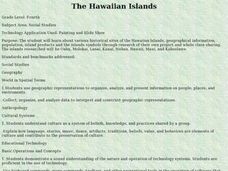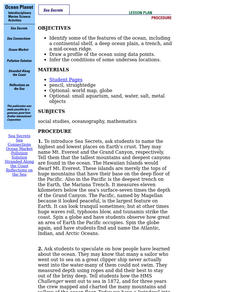Channel Islands Film
Island Rotation: Lesson Plan 3
How far have California's Channel islands moved? What was the rate of this movement? Class members first examine data that shows the age of the Hawaiian island chain and the average speed of the Pacific Plate. They then watch West...
Curated OER
Northwest Hawaiian Islands
Students compare and contrast places around the world. Students analyze the effects of human activity on the physical environment and devise plans to address the consequences. Students also focus on geographical topics such as formation...
Curated OER
Where in the World is Hawaii?
Students compare a globe and a two-dimensional world map and explore how they both represent the planet Earth. They locate the Hawaiian Islands on the globe or the world map and describe how the geographical position is unique.
Curated OER
Hawaiian Hot Spots
Students discuss how plate tectonics and volcanic activity have affected Hawaii. In this Hawaiian instructional activity, students look at maps and photographs of Hawaiian Islands and discuss their formation through multiple volcanic...
Curated OER
Hawaii State Map
In this Hawaii state map instructional activity, students color and label important locations and physical features on the map of the 8 islands of Hawaii.
Curated OER
Hawaii: A Stolen Star
Explore the islands of Hawaii. Investigate Hawaiian culture and compare their personal traditions to Hawaiian traditions. They locate Hawaii on a map and research the history of Hawaii.
NOAA
Into the Deep
Take young scientists into the depths of the world's ocean with the second lesson of this three-part earth science series. After first drawing pictures representing how they imagine the bottom of the ocean to appear, learners...
Curated OER
Map of Hawaii
In this map worksheet, students view a blank map of the Hawaiian Islands. Worksheet has no associated activities, but is a generic blank organizer/map. A reference web site is given for additional activities.
Curated OER
A Feature Presentation - Geographic Landforms
Students investigate, identify and compare the various geographic terms that can be used to describe the landforms occurring in the Hawaiian islands.
Curated OER
Pearl Harbor
Students identify the location of Pearl Harbor and Hawaiian Islands on a map. In this map skills lesson, students use latitude and longitude coordinates to locate various places of importance of the Pearl Harbor attack.
Curated OER
Aloha From the King
Through this activity pupils learn about King Kamehameha I, and letter writing. It begins with an overview of Hawaiian history, with an emphasis on King Kamehameha I, and then goes on to a letter writing activity. Each person writes a...
Curated OER
Where in the World Am I: Latitude And Longitude
Learners demonstrate their knowledge in using latitude and longitude measurements to find locations on a map, especially places in Hawaii.
Curated OER
Hawaiian Hot Spots
Students describe how plate tectonics contribute to the development of volcanoes. In this earth science lesson, students examine the map of Hawaii and explore the physical and biological environment there. They write a story about an...
Curated OER
Water Issues on Puerto Rico and Oahu: A Comparison of Two Islands
Fifth graders explore how the tow islands receive and use fresh water. They also address some of the threats to the fresh water supply on each island. Students explore the lesson objectives through water cycle models and experiments.
Curated OER
Mapping Deep-Sea Habitat
Learners create a two-dimensional topographic map and a 3-D model of landforms. In this creative lesson students create 2 and 3-D objects and learn how to interpret the data from these things.
Curated OER
Islands Near and Far: A Comparison of Beach Sediment Samples from Hawaii Island and Isle Royale, MI
Eighth graders gather data from beach sediment samples from the Hawaiian Islands and from Isle Royale, MI to determine what these samples can tell about the origins of these land masses. They study the geography of the two islands and...
Curated OER
The Hawaiian Islands
Fourth graders present information of people, places, and environments. They collect, organize, and analyze date to use with these representations.
Curated OER
A Monument for Marine Conservation
Young scholars explore the Northwestern Hawaiian Islands to discover what's there and pick up clues as to how people have both harmed and helped the native habitats. They study another protected area and see how to balance conservation...
Curated OER
Biodiversity
Students explore the biodiversity of the national marine sanctuaries. In this science lesson, students view a video about Cordell Bank National Marine Sanctuary and Hawaiian Islands Humpback Whale National Marine Sanctuary. Students work...
Curated OER
Top to Bottom
Marine science classes read about the 2005 North Atlantic Stepping Stones Expedition and review climate change. They use maps to locate the seamount chains. In collaborative groups, they research how climate change may be altering the...
Curated OER
Ocean Planet: Sea Secrets
Students identify ocean features and draw a profile using data points on a map. Through discussion and research, they discover the importance of oceanography and plot a profile of the ocean floor in search for a vessel full of precious...
Curated OER
Voyage to Kure Viewing Guide
Students complete a worksheet while viewing a video about the oceans. They locate the oceans on a map and identify positive and negative ways in which humans have impacted them. They discuss any questions at the end of the lesson.
Curated OER
Island Breezes: Exploring Hula Dance
Students explore Hawaii and the art of hula dance. In this art lesson, students research the art of hula dance and Hawaii. Students create their own unique hula dance.
NOAA
Plate Tectonics I
Young geologists get a glimpse beneath the earth's surface in this plate tectonics investigation. After first learning about the different layers of the earth and the constant movement of its plates, young...

























